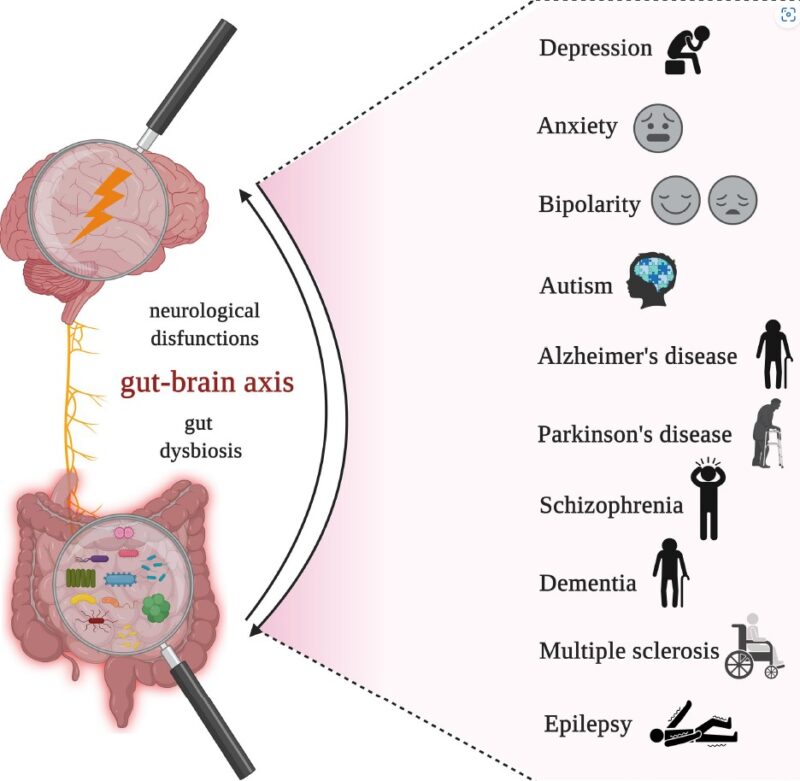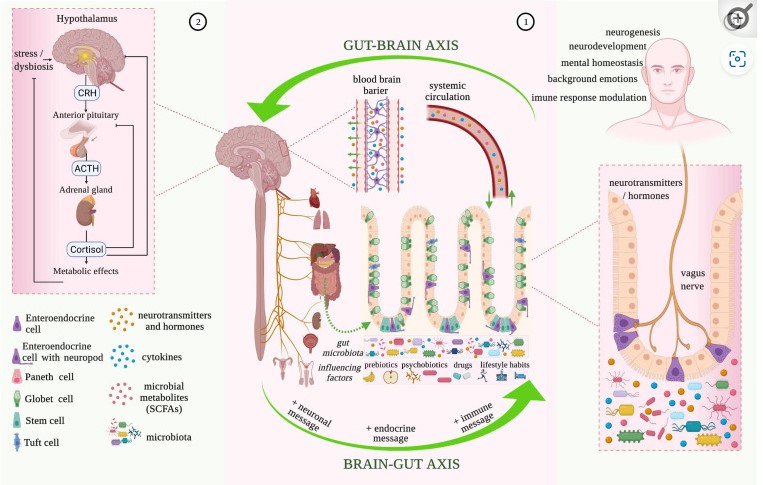Gut microbiota and brain: How do they interact?


Emerging research suggests that the gut microbiota may play a critical role in neurodevelopment, behaviour, emotions, cognitive development, and the progression of neuropsychiatric diseases. In this summary we clearly explain the interaction between the gut microbiota and the brain. Finally, we focus on two psychiatric disorders depression and anxiety. The article is based on a review by Mitrea et al. published in the journal ‘Frontiers in Medicine’ in 2022.
The microbiota as a virtual organ
A human gut hosts over 100 trillion microbes that influence health. More specifically, metabolic and nutritional homeostasis, immune system functioning, intestinal barrier integrity, and cerebral activity are all influenced and modulated by the gut microbiota. This makes the microbiome the great “virtual organ” of the body. Microbes are key signaling components in the bidirectional communication of the gut-brain axis. Any discrepancy in gut microbiota and host communication can be considered as a triggering element in the pathogenesis of several neurological and psychiatric diseases. Certain gut microbes, directly or indirectly, impact the nervous system’s function, mood, and behaviour, hence earning the name ‘psychobiotics’.

The communication channels of the gut-brain-axis
The gut and the brain communicate through three different channels:
- the nervous system, which relays information in the form of neurotransmitters to and throughout the brain via the vagus nerve
- the immune system, which communicates via inflammatory cells, called cytokines, to activate the hypothalamic-pituitary-adrenal axis (HPA axis)
- the endocrine system, which involves glandular release of hormone signals throughout the body, for example, cortisol released by the adrenal gland.
How do gut and brain interact?
The bidirectional communication between the gut and the brain is illustrated below in figure 1.
1.The vagus nerve runs from the brainstem down through the neck, chest, and abdomen. As a consequence it serves a wide variety of functions throughout the body. Accordingly, it has an important role in the modulation of inflammation, maintenance of intestinal homeostasis, and regulation of food intake, satiety, and energy homeostasis. It is clear that the vagus nerve plays a significant role in the pathogenesis of psychiatric disorders as well as other stress-induced and inflammatory diseases. As many as 80% of the sensory fibres transfer information on the state of inner organs (heart, lung, pancreas, stomach, liver, and intestines) to the brain.
The vagus nerve transfers information on the state of the digestive system to the brain through sensory fibres. As a reaction the brain sends neuronal, endocrine, and immune messages to the gut microbiota. The brain uses different pathways such as bidirectional vagus nerve-to-brain communication, or through the enteric nervous system (nervous system of the gut or ENS) and enteroendocrine cells.The systemic circulation has an important function in transporting gastrointestinal bioactive molecules to the brain. These include neurotransmitters and hormones, cytokines, and microbial metabolites such as short fatty acids (SCFA). External factors such as prebiotics, probiotics, drugs, and lifestyle habits influence the production of these molecules.
2.The Hypothalamic-Pituitary-Adrenal (HPA) axis is a complex neuroendocrine system that regulates the body’s response to stress. In detail, it releases hormones from the hypothalamus (corticotropin-releasing hormone CRH), pituitary gland (adrenocorticotropic hormone, ACTH), and adrenal gland (cortisol). Cortisol is responsible for the modulation of the intestinal epithelial barrier and immune responses.
3.Enteroendocrine cells are one of the most important influencers of bidirectional brain-gut communication. The nerve supply to neuronal circuits by the vagus nerve modulates the pain response, background emotions, immune-response, neurogenesis, and neurodevelopment. The vagus nerve also has immunomodulatory properties and plays an essential role in gastrointestinal and psychiatric disorders such as depression and anxiety.
Figure 1: Microbiota-gut-brain bidirectional relationship
Depression
Depression, or more precisely major depressive disorder (MDD), affects about 4.4% of the global population (WHO). It is characterized by persistent feelings of sadness, hopelessness, and a lack of interest in activities. Research has shown that gut dysbiosis may play a role in the development of depression, likely through the gut-brain axis. At the moment, MDD is usually treated with antidepressants, which strengthen the neurotransmitter densities in the synaptic cleft, such as norepinephrine and serotonin. The same transporters and receptors related to depression are also found in the gut. As a result, they are in close interaction or are influenced by the gut microbiota.
There is emerging evidence that a stress response through the HPA-axis in combination with signaling factors generated by the microbiota causes neuro-inflammatory processes. This contributes to the development or worsening of depressive symptoms. The connection among gut microbiota, immune system, and stress matrix was evidenced in two recent reviews by Cheung et al. and Cruz-Pereira et al. .
Gut microbiota is altered in depression
Numerous studies prove that the gut-brain axis represents an essential part in the evolution of depression. Compared to the gut microbiota of healthy individuals, those of individuals with depression are substantially altered. A study by Jiang et al. found that comparing the microbiome composition of MDD patients and healthy controls resulted in significant differences in the three main levels of phyla: namely increased Proteobacteria and Bacteroidetes, and decreased Firmicutes percentage. The same conclusion was drawn by Zheng et al., who demonstrated that mice colonized with the gut microbiota of patients with MDD led to elevated depression-like behaviour. Evidence from clinical trials on patients with MDD suggests that their intestinal microbiota is significantly different from those of healthy individuals. Even though these studies pointed out disturbances in gut microflora, precise discrepancies between patients diagnosed with MDD and healthy individuals are still under discussion, and further investigations are needed.
Anxiety
Anxiety conditions are quite frequent among adults. Worldwide, generalized anxiety disorder (GAD) affects around 4–6% of the global population. GAD is reflected by habitual negative thinking, swinging thoughts (i.e. concentration difficulties, rambling), irritability, sleep problems, muscle tension, and extreme or uncontrolled everyday anxieties produced for at least six months.
A study conducted on germ-free mice demonstrated that intestinal microbiota transferred from mice without maternal separation positively impacts intestinal dysbiosis. Furthermore, it diminishes anxiolytic behaviour. There are several other studies on animals outlining the relationship between anxiety and gut microbiota, but very few on individuals with GAD.
The first study conducted on patients with GAD revealed diminished gut microbiota, encompassing alterations amid eight genera. Here, a higher level of Bacteroides compared to that found in the microbiota of healthy individuals was observed. This can be related to anxiety-like disorders. Another study outcome was the low preponderance of SCFA-generating bacteria in patients with GAD.
Research on probiotics
Probiotics have been shown to have positive effects on reactivity to sad mood in adult humans by helping in the reduction of negative thoughts. Steenbergen et al. administered a multispecies probiotic (Ecologic Barrier) to 20 healthy young adults for four weeks. At the end of the trial, which used a revised Leiden index of depression sensitivity scale, a significant decrease in cognitive reactivity to sad disposition was observed. Another study investigated the favourable effect of probiotics on anxiety-related conditions. It revealed optimistic results with reduced anxiety manifestations and improved social interaction in treated patients (8). Several studies conducted on animal models and human patients reveal the beneficial effect of probiotics such as Lactobacillus and Bifidobacterium on anxiety. Messaoudi et al. observed the beneficial anti-anxiety effect of probiotics on both rats and humans.
Probiotics have potential
Probiotics have a great potential in maintaining both gastrointestinal and neurological homeostasis. More studies must be conducted on the correlation with the health status of treated patients, age range, probiotic formulations, dosage, and time of administration and also to elucidate the working mechanisms. Probiotics administered as food supplements maintain the host’s general health status because of their resistance through the gastrointestinal tract, their good adhesivity to the intestinal mucosa, and their specific metabolites delivered in systemic circulation.
This article is based on: MITREA, Laura, et al. Guts imbalance imbalances the brain: a review of gut microbiota association with neurological and psychiatric disorders. Frontiers in Medicine, 2022, 9. doi: 10.3389/fmed.2022.813204
Interesting updates in your mailbox
Subscribe to our newsletter and receive the latest news about Winclove, probiotic-related research & publications, relevant market developments and inspiring articles.









